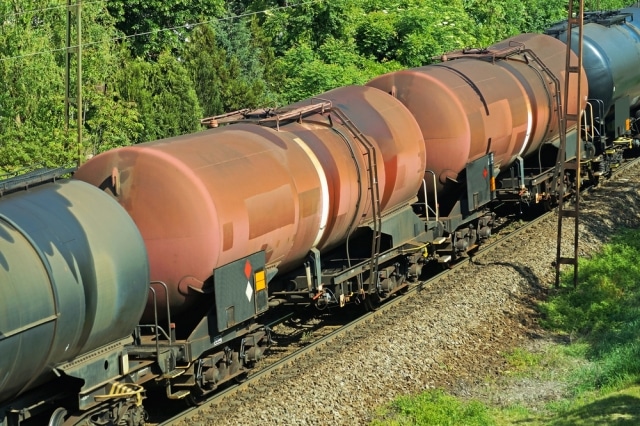The battle over oil train regulation is heating up, as both the oil and gas industry and a coalition of environmental groups have now filed lawsuits challenging new Department of Transportation regulations this week.
The move to the courtroom comes following a string of oil train explosions in the U.S. and Canada so far this year and in a passenger train wreck in Philadelphia on Tuesday night that killed 8.
The rules, issued on May 1, were already the subject of intense lobbying, not only by the railroad industry which has seen its profits spike as the shale rush led companies to pump out oil with no pipelines to transport it in states like North Dakota, but also by the oil and gas industry.
As DeSmog previously reported, that lobbying seemed to have succeeded in large part, as the federal government failed to require notoriously volatile Bakken crude oil to be stabilized before heading out on the nation’s railways.
Seven environmental groups — Earthjustice, ForestEthics, Sierra Club, Waterkeeper Alliance, Washington Environmental Council, Friends of the Columbia Gorge, Spokane Riverkeeper, and the Center for Biological Diversity — together filed a lawsuit on Thursday in the 9th Circuit, citing a litany of shortcomings in the new safety rules.
“We’re suing the administration because these rules won’t protect the 25 million Americans living in the oil train blast zone,” Todd Paglia, ForestEthics Executive Director, said in a statement about the newly filed case.
“Let’s start with common sense,” he added, “speed limits that are good for some cities are good for all communities, 10 years is too long to wait for improved tank cars, and emergency responders need to know where and when these dangerous trains are running by our homes and schools.”
The rules, developed in coordination with Canadian officials, will allow railroads to take years to phase out DOT-111 tankers, which the National Transportation Safety Board has found are easily punctured during a crash. And the CPC-1232 tankers that will be allowed to replace DOT-111’s have already been involved in at least four incidents where Bakken oil exploded following a derailment.
“The recent surge in U.S. and Canadian oil production, much of it from Bakken shale and Alberta tar sands, led to a more than 4,000 percent increase in crude oil shipped by rail from 2008 to 2013, primarily in trains with 100 to 120 oil cars that can be over 1.5 miles long,” the groups wrote in a statement announcing the lawsuit. “More oil spilled in train accidents in 2013 than in the 38 years from 1975 to 2012 combined.”
The groups laid out a long list of major shortcomings of the federal rules including:
– Allowing DOT-111 and CPC-1232 tankers to keep carrying Bakken crude for 10 years, and failing to regulate the use of the same cars to carry tar sands dilbit – which is crude diluted with other more flammable petroleum products, giving it a lower ignition point and making it more volatile.
– Allowing trains to travel at speeds up to 50 miles per hour in most cities and towns, and only imposing a lower 40 mph speed limit on 7 percent of the nation’s track. The groups objected to the DOT‘s methods for deciding where to apply lower speed limits, saying the agency didn’t consider whether the trains passed through “densely populated urban areas, rural communities, and alongside drinking water supplies, fishing streams, schools, and national parks,” but instead only require slower speeds in areas based on a model centered on the risk of terrorist attacks.
– Setting speed limits at more than double the velocity that new tanker cars are succeptible to punctures. Although trains will be allowed to move at 40-50 mph, upgraded cars will only be required to be puncture resistant at speeds between 9.6 and 18.4 mph.
– Failing to cover trains hauling less than 35 tanker cars – enough to hold roughly a million gallons of crude – which the environmental groups labeled “a huge loophole.”
– Allowing the industry to “retrofit” tankers instead of upgrading them, and allowing retrofitted tankers to have thinner shells than new tank cars would.
– Allowing the rail industry to add 7,000 new tankers to the nation’s railways in 2016 even as older more hazardous models continue to traverse the rails.
– Failing to require railroads to respond to requests for information from State Emergency Response Centers. The DOT cited concerns that train route information could be used for criminal activity, but the groups objected that the only case DOT cited involving track vandalism “is not used for oil trains and in fact is out of service and overgrown with prairie grass.” The DOT‘s rules previously drew the ire of union officials representing firefighters across North America. “Fire fighters depend on all available information to launch an effective response to emergencies like oil explosions. They need to know what trains are carrying and when,” Harold Schaitberger, general president of the union told Huffington Post. “These new rules fall short of requiring rail operators to provide the information fire departments need to respond effectively when the call arrives.”
– Using the wrong formulas to figure out how bad oil train disasters could be, leading the agency to severely underestimate the potential harms. DOT, the groups said, calculated that an average oil disaster might cost $2.8 billion, when others predicted the same disaster would do $7.8 billion in harm. “DOT appropriately recognizes that catastrophes like Lac Mégantic or worse could happen given the volume and hazards of crude-by-rail traffic and the defective tank cars used to transport crude,” the groups wrote. “But then it low balls both the likelihood of such catastrophes and the potential severity of their harm.”
Since the DOT announced its rules, at least two urban train derailments that did not involve oil explosions have nonetheless heightened concerns about an accident in a highly populated area. An 11-car freight train derailment in Pittsburgh the same day Earthjustice’s lawsuit was filed left some locals wary of a similar incident involving tankers that travel the same tracks.
And in Philadelphia, Tuesday night’s deadly wreck of an Amtrak passenger train in a corridor often traveled by oil trains prompted many to worry that if oil trains had been involved, the incident could have been worse by many orders of magnitude.
“This is a horrific tragedy and we don’t yet know the cause but we do know that Philadelphians are daily living in terror that one of these oil trains will derail or explode or spill or leak,” Elizabeth Arnold, an organizer with EDGE, which has called for a ban on oil trains in Philadelphia’s densely populated neighborhoods, told DeSmog.
Because trains are federally regulated, state and local policy-makers are limited in their ability to respond to such concerns.
“Pleas from the public, reinforced by the National Transportation Safety Board, to stop hauling explosive crude in these tank cars have fallen on deaf ears, leaving people across the country vulnerable to catastrophic accidents,” said Patti Goldman, Earthjustice attorney.
Meanwhile, the oil and gas industry has filed a lawsuit of its own. On Monday, the American Petroleum Institute filed its complaint in the District of Columbia Circuit, saying that the rules failed to allow enough time for retrofitting rail fleets.
The API‘s suit also objects to requirements to upgrade train brakes to use new electronic braking systems.
“These provisions are, either individually or in conjunction with each other, challenges as arbitrary, capricious, an abuse of discretion, or otherwise not in accordance with law, and/or in excess of statutory jurisdiction, authority, or limitations, or short of statutory right,” API‘s complaint asserts.
Photo Credit: Freight Train, via Shutterstock.
Subscribe to our newsletter
Stay up to date with DeSmog news and alerts






